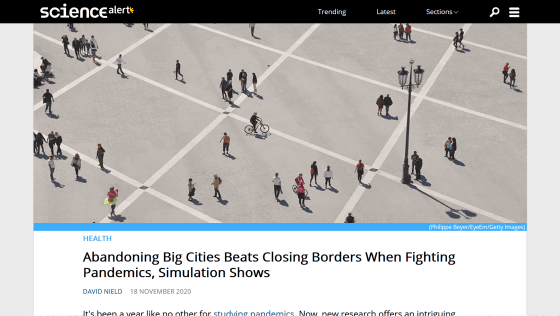“People move from urban areas to rural areas” rather than blockade cities could reduce the number of infected people

With the pandemic of the new coronavirus, measures such as urban blockade were implemented in each country, and movement from urban areas to rural areas was prohibited. Studies have shown that the blockade of cities
Travel restrictions during pandemics: A useful strategy ?: Chaos: An Interdisciplinary Journal of Nonlinear Science: Vol 30, No 11
https://aip.scitation.org/doi/10.1063/5.0028091
In a Pandemic, Migration Away from Dense Cities More Effective than Closing Borders --AIP Publishing LLC
https://publishing.aip.org/publications/latest-content/in-a-pandemic-migration-away-from-dense-cities-more-effective-than-closing-borders/
Abandoning Big Cities Beats Closing Borders When Fighting Pandemics, Simulation Shows
https://www.sciencealert.com/abandoning-large-cities-beats-closing-borders-when-fighting-pandemics

During a pandemic, the number of infected people tends to increase in densely populated urban areas, and in less densely populated areas the risk of infection tends to be relatively low. Therefore, some urban residents thought, 'If you move to a region with a low population density, you may be able to reduce the possibility of infection,' and moved to a rural area before the city was closed or the border was closed. There were also people.
However, migrants from urban areas, where many people are infected, are anxious for local people, and if infected people in urban areas actually move to rural areas, the infection will spread even in rural areas where infection has been suppressed. There is a risk of In response to these voices, many countries have put forth policies to limit the movement of people by implementing measures such as city blockades.

Simulations focused on unidirectional migration from densely populated urban areas to less densely populated rural areas showed, as expected, a decrease in urban infection rates but an increase in rural infection rates. However, it seems that the overall infection rate in both urban and rural areas has decreased in many cases, and it has been found that moving people from urban areas to rural areas weakens the epidemic of infectious diseases.
For example, in a simulation with an urban population density of 90% and a rural population density of 10%, the overall infection rate was 35% in a non-moving scenario. In response to this result, researchers report that the infection rate was reduced to 23% by simulating a scenario of unidirectional movement from urban areas to rural areas.
Moving from a big city to a rural area can have a negative impact on a small community. However, researchers point out that adverse effects can be mitigated by conducting health examinations for new movers, allowing only healthy people to move, and temporarily quarantining those who have moved. On the other hand, if people move back and forth between big cities and rural areas many times instead of moving from big cities to rural areas, the benefits of population density reduction will decrease and the infection will spread. It seems that it was done.

This simulation is based on a simplified model of the situation and may not be directly applicable to complex real-world scenarios. In the real world, it is necessary to consider not only simple infection rates but also various economic and social factors, whether urban people allow migration to rural areas, and local people welcome urban residents. Whether or not is also important. According to Zanin, some people interpret the results independently and argue that 'the government that blocked the city was wrong,' but Zanin said he did not agree or disagree with the government's policies. Said.
Related Posts:
in Science, Posted by log1h_ik







